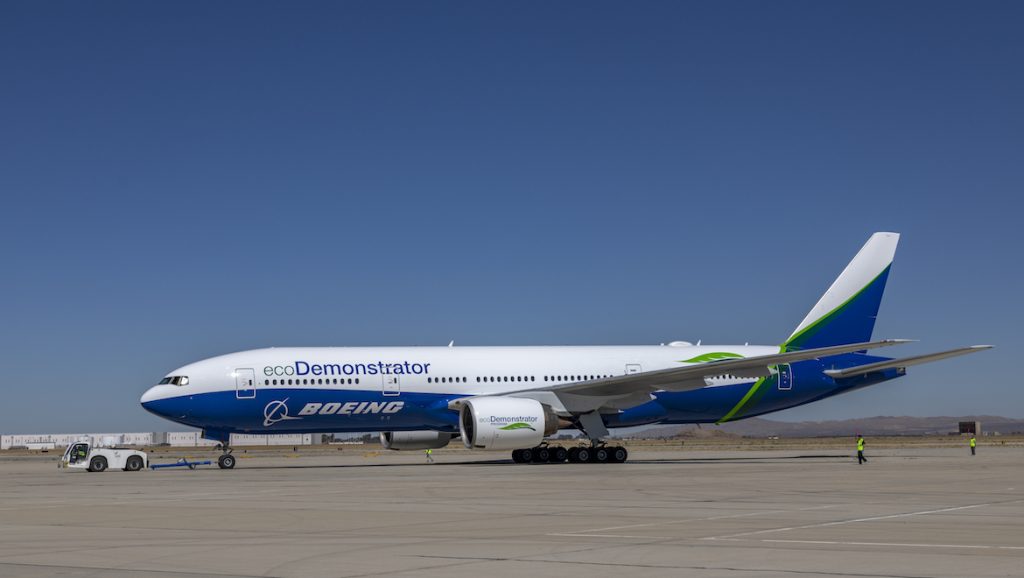
Seven of the biggest global aerospace giants have joined together to cut through the remaining “technical barriers” blocking the ramp up of a sustainable aviation industry.
In a joint statement, the chief technical officers of Boeing, Airbus, Dassault Aviation, GE Aviation, Rolls-Royce, Safran and Pratt & Whitney said they are progressing towards achieving net zero emissions by 2050.
Together, they are pushing for the allowance of up to 100 per cent sustainable aviation fuels (SAF) in aircraft, as current regulations only permit a blend of up to 50 per cent with common jet fuel.
It comes only months after the Biden administration announced advancements of sustainable aviation in September, introducing tax credits and new funding across the sector in the United States.
The White House pledged to reduce aviation emissions by 20 per cent by 2030, backed by several government agencies.
“The development of fuel-efficient technologies that significantly reduce carbon emissions is an important lever to achieve our targets and has been a priority for the aviation industry for over 50 years,” the joint statement said.
Collaboratively, the seven global companies are pushing to decarbonise aviation through these three areas, according to the statement:
- Advancing the state-of-the-art in aircraft and engine design and technology.
- Supporting increased availability and adoption of sustainable aviation fuel and investigating hydrogen as a fuel of the future.
- Continuing to mature novel technologies that will eventually enable net zero carbon aviation while maintaining the safety and quality standards of the industry.
As consumers are more sustainably driven in purchasing decisions, the aviation industry has become increasingly pressured to invest in greener technologies.
Airlines and airports have more recently boosted commitments in SAF, in a bid to reclaim customers after the COVID-19 crisis.
The statement said despite the industry contributing 2.5 per cent of manmade carbon emissions, aviation remains vital to “global connectivity” and “international aid”.
“Our companies are … committed to removing aircraft and engine technical barriers to the adoption of 100 per cent SAF,” the release said.
“We are taking an active role in establishing the certification requirements for aviation fuels comprised of 100 per cent synthesised hydrocarbons to allow the phase out of fossil fuels.”
Over the years, there has been an increasing interest in SAF, but the cost has inevitably outweighed its growth in the industry.
The companies said they are committed to seeing SAF become available at scale – by increasing its supply chain – which will reduce the price and encourage more companies to consider it.
The White House in September said it proposed tax credits requiring at least a 50 per cent reduction in greenhouse gas emissions, leading to increased incentives for greater cuts.
“We support the deployment of appropriate regional policy mechanisms and positive incentives that stimulate the production of staff to enable the industry to meet its ambitious staff utilisation targets,” the statement said.
In July, the European Union’s Green Deal also proposed a taxation framework which would see cleaner fuels receive a zero minimum tax rate for a period of over 10 years.
While this would increase kerosene prices, industry leaders said policymakers should push for incentives for SAF use instead of resorting to taxation.
The statement also claimed the businesses will ramp up the development of sustainable manufacturing, by improving the fuel efficiency of aircraft and engines.
To achieve a decarbonised industry, a “globally consistent approach” of regulatory frameworks and certification standards is required, the aerospace giants said.
“The aviation industry plays a pivotal role in modern life connecting companies, economies, families and countries,” the statement said.
“We are convinced that it has a sustainable future, but an industry-wide mobilisation is required to make it happen.”










